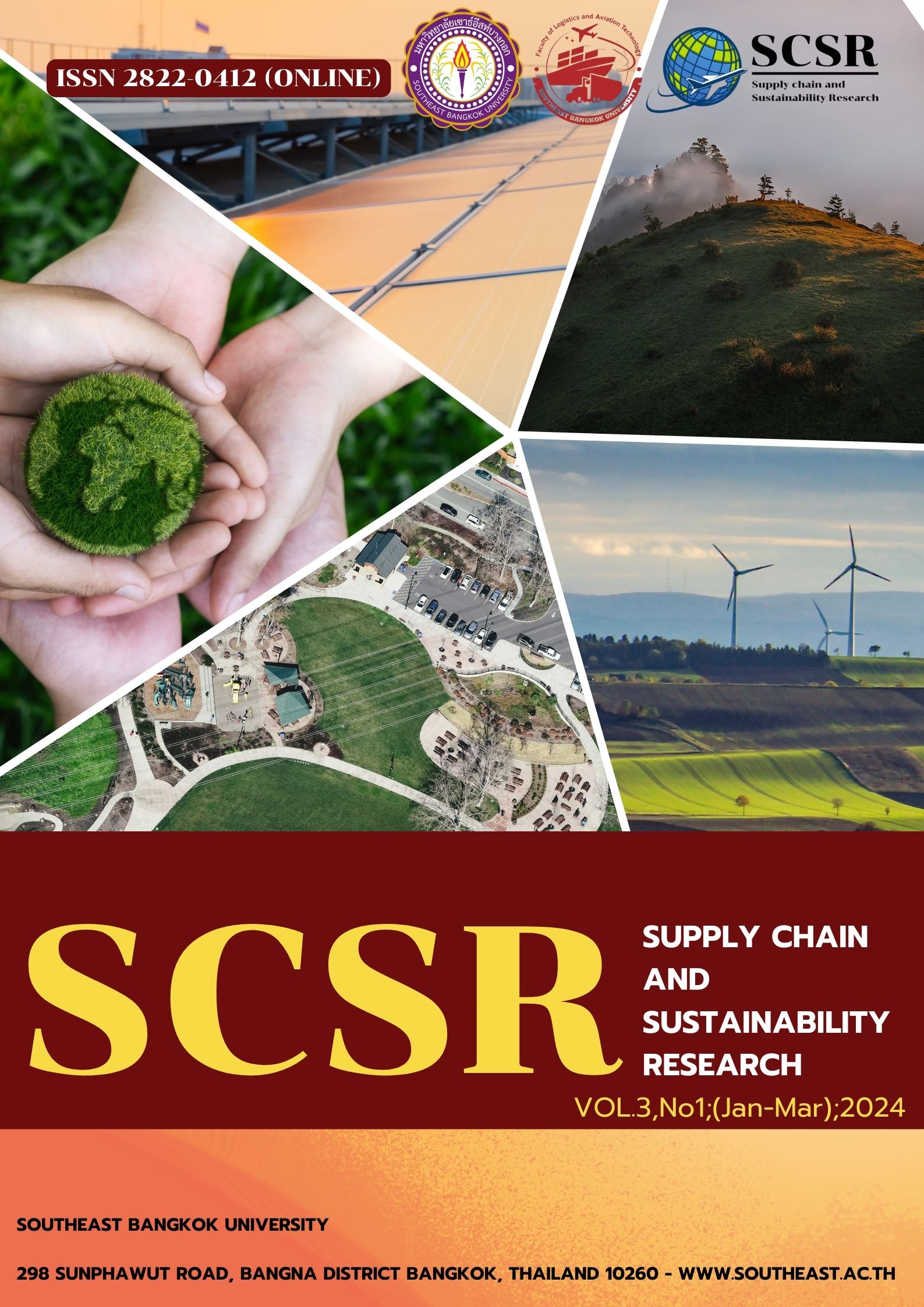Interplay Between Carbon Trading and Supply Chain Management: A Case Study of the Taiwan Carbon Exchange
Main Article Content
บทคัดย่อ
This study conducts an in-depth examination of the Taiwan Carbon Exchange through a case study approach, employing diverse research methods such as data collection, corporate interviews, analysis, and the utilization of questionnaires to gain insights into its operational model and broader impact on the carbon market. Corporate interviews yield firsthand insights and opinions from key industry stakeholders, while questionnaires ensure a broader participant base, fostering a more diverse range of opinions and data. Focusing on the carbon exchange as the subject of research allows for a thorough analysis of Taiwan's practicalities in carbon trading. The empirical information gathered strengthens the study's conclusions and enhances their reliability. This research aims to provide a comprehensive understanding of the carbon exchange's operational framework, its influence on the carbon market, and the future trajectory of Taiwan's carbon trading development.
Article Details

อนุญาตภายใต้เงื่อนไข Creative Commons Attribution-NonCommercial-NoDerivatives 4.0 International License.
บทความนี้ได้รับการเผยแพร่ภายใต้สัญญาอนุญาต Creative Commons Attribution-NonCommercial-NoDerivatives 4.0 International (CC BY-NC-ND 4.0) ซึ่งอนุญาตให้ผู้อื่นสามารถแชร์บทความได้โดยให้เครดิตผู้เขียนและห้ามนำไปใช้เพื่อการค้าหรือดัดแปลง หากต้องการใช้งานซ้ำในลักษณะอื่น ๆ หรือการเผยแพร่ซ้ำ จำเป็นต้องได้รับอนุญาตจากวารสารเอกสารอ้างอิง
Ahonen, H. M., Kessler, J., Michaelowa, A., Espelage, A., & Hoch, S. (2022). Governance of fragmented compliance and voluntary carbon markets under the Paris Agreement. Politics and Governance, 10(1), epub.
Chimei Cooperation. (2022). Chimei becomes the first Taiwanese company to complete carbon credit trading and offsetting on the CIX platform. Retrieved from https://www.chimeicorp.com/zh-TW/?page=article&id=62c6763c34d886f39314b29a.
Falkner, R. (2016). The Paris Agreement and the new logic of international climate politics. International Affairs, 92(5), 1107-1125.
Fankhauser, S., Smith, S. M., Allen, M., Axelsson, K., Hale, T., Hepburn, C., ... & Wetzer, T. (2022). The meaning of net zero and how to get it right. Nature Climate Change, 12(1), 15-21.
Han, Y. G., Huang, H. W., Liu, W. P., & Hsu, Y. L. (2023). Firm-value effects of carbon emissions and carbon disclosures: evidence from Taiwan. Accounting Horizons, 1-21.
Hansen, J., Kharecha, P., Sato, M., Masson-Delmotte, V., Ackerman, F., Beerling, D. J., ... & Zachos, J. C. (2013). Assessing “dangerous climate change”: Required reduction of carbon emissions to protect young people, future generations, and nature. PloS one, 8(12),
e81648.
Hepburn, C. (2007). Carbon trading: a review of the Kyoto mechanisms. Annu. Rev. Environ. Resource., 32, 375-393.
Huang, Y. H.,& Wu, J. H. (2009). Energy policy in Taiwan: Historical developments, current status and potential improvements. Energies, 2(3), 623-645.
Kharecha, P., Sato, M., Masson-Delmotte, V., Ackerman, F., Beerling, D. J., ... & Zachos, J. C. (2013). Assessing “dangerous climate change”: Required reduction of carbon emissions to protect young people, future generations, and nature. PloS one, 8(12), e81648.
Lacoste, A., Luccioni, A., Schmidt, V., & Dandres, T. (2019). Quantifying the carbon emissions of machine learning. arXiv preprint arXiv:1910.09700.
Lederer, M. (2012). Market making via regulation: The role of the state in carbon markets. Regulation & Governance, 6(4), 524-544.
Lee, K. H. (2011). Integrating carbon footprint into supply chain management: the case of Hyundai Motor Company (HMC) in the automobile industry. Journal of cleaner production, 19(11), 1216-1223.
Lee J.M. (2023). The dawn of Taiwan’s net zero-Taiwan Carbon Exchange is established. Accounting Research Monthly, (452), 64-75.
Lin T.R., Wang R.S., Hsie B.H., & Hsu C.S. (2015). Advantage analysis and integration planning of Taiwan’s carbon rights trading platform. Business Management Science and Technology Quarterly, 16(2), 269-289.
Narassimhan, E., Gallagher, K. S., Koester, S., & Alejo, J. R. (2018). Carbon pricing in practice: A review of existing emissions trading systems. Climate Policy, 18(8), 967-991.
Newell, R. G., Pizer, W. A., & Raimi, D. (2013). Carbon markets 15 years after Kyoto: Lessons learned, new challenges. Journal of Economic Perspectives, 27(1), 123-146.
Ou, J., Liu, X., Li, X., & Chen, Y. (2013). Quantifying the relationship between urban forms and carbon emissions using panel data analysis. Landscape ecology, 28, 1889-1907.
Pan, X., Teng, F., Ha, Y., & Wang, G. (2014). Equitable access to sustainable development: based on the comparative study of carbon emission rights allocation schemes. Applied Energy, 130, 632-640.
Steinebach, Y., Fernández-i-Marín, X., & Aschenbrenner, C. (2021). Who puts a price on carbon, and why and how? A global empirical analysis of carbon pricing policies. Climate Policy, 21(3), 277-289.
TCX. (2023). Business: International carbon credits available by the end of 2023. Focus Taiwan. https://focustaiwan.tw/business/202310190022
Van Den Berg, C., Couwenberg, O., & Weishaar, S. E. (2014). Carbon Leakage in the Regional Greenhouse Gas Initiative: Lessons Learn for the European Union Emissions Trading Scheme. University of Groningen Faculty of Law Research Paper, 6.
Wang, H., Chen, Z., Wu, X., & Nie, X. (2019). Can a carbon trading system promote the transformation of a low-carbon economy under the framework of the Porter hypothesis? - Empirical analysis based on the PSM-DID method. Energy policy, 129, 930-938.
Yao, H.R. (2023, December 22). Responding to Carbon Exchange's Launch of First Carbon Rights Trading! Yuanta Gold Actively Purchases 5,000 Tons of Carbon Rights. TechNews Finance News. https://finance.technews.tw/2023/12/22/carbon-rights-trading/
Zhang, A., Tay, H. L., Alvi, M. F., Wang, J. X., & Gong, Y. (2023). Carbon neutrality drivers and implications for firm performance and supply chain management. Business Strategy and the Environment, 32(4), 1966-1980. change, 9(5), 374-378.
Zhang, Y. J., Liang, T., Jin, Y. L., & Shen, B. (2020). The impact of carbon trading on economic output and carbon emissions reduction in China’s industrial sectors. Applied Energy, 260, 114290.
Zheng, J., & Suh, S. (2019). Strategies to reduce the global carbon footprint of plastics. Nature climate.


